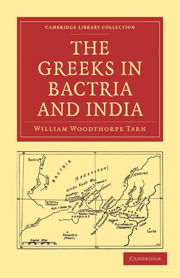Book contents
- Frontmatter
- Contents
- Prefaces
- Abbreviations
- Introduction
- PART I (INTRODUCTORY): THE BACKGROUND IN THE MIDDLE EAST
- PART II BACTRIA AND INDIA
- CONCLUSION
- Excursus. The Milindapañha and Pseudo-Aristeas
- Appendix 1 Monograms and find-spots
- Appendix 2 The names in -ηνη
- Appendix 3 Agathocles' pedigree coins
- Appendix 4 The Yuga-purāna of the Gārgī Samhitā
- Appendix 5 Demetrius in the Hāthigumphā inscription of Khāravela
- Appendix 6 Alexandria of the Caucasus and Kapisa
- Appendix 7 Antiochus IV and the temple of Nanaia
- Appendix 8 A sealing from Seleuceia
- Appendix 9 Ki-pin (Kophen) and ‘Arachosia’
- Appendix 10 Ta-yuan
- Appendix 11 Chorasmia
- Appendix 12 Ormuz: a lost kingdom
- Appendix 13 Σάγαλα ἡ καὶ Εὐθυμέδεια
- Appendix 14 The supposed Oxo-Caspian trade route
- Appendix 15 The Oxus question to-day
- Appendix 16 The Era of the Moga copperplate from Taxila
- Appendix 17 The Hermaeus-Kujula Kadphises coins
- Appendix 18 San and Rho
- Appendix 19 Pāndava-Pāndu and Pāndhya
- Appendix 20 The Chinese sources
- Appendix 21 The Greek names of the Tochari
- Addenda
- Addenda (1950) to the Second Edition
- General Index
- Index of Principal Greek and Latin Passages
- Plate section
Appendix 20 - The Chinese sources
Published online by Cambridge University Press: 10 November 2010
- Frontmatter
- Contents
- Prefaces
- Abbreviations
- Introduction
- PART I (INTRODUCTORY): THE BACKGROUND IN THE MIDDLE EAST
- PART II BACTRIA AND INDIA
- CONCLUSION
- Excursus. The Milindapañha and Pseudo-Aristeas
- Appendix 1 Monograms and find-spots
- Appendix 2 The names in -ηνη
- Appendix 3 Agathocles' pedigree coins
- Appendix 4 The Yuga-purāna of the Gārgī Samhitā
- Appendix 5 Demetrius in the Hāthigumphā inscription of Khāravela
- Appendix 6 Alexandria of the Caucasus and Kapisa
- Appendix 7 Antiochus IV and the temple of Nanaia
- Appendix 8 A sealing from Seleuceia
- Appendix 9 Ki-pin (Kophen) and ‘Arachosia’
- Appendix 10 Ta-yuan
- Appendix 11 Chorasmia
- Appendix 12 Ormuz: a lost kingdom
- Appendix 13 Σάγαλα ἡ καὶ Εὐθυμέδεια
- Appendix 14 The supposed Oxo-Caspian trade route
- Appendix 15 The Oxus question to-day
- Appendix 16 The Era of the Moga copperplate from Taxila
- Appendix 17 The Hermaeus-Kujula Kadphises coins
- Appendix 18 San and Rho
- Appendix 19 Pāndava-Pāndu and Pāndhya
- Appendix 20 The Chinese sources
- Appendix 21 The Greek names of the Tochari
- Addenda
- Addenda (1950) to the Second Edition
- General Index
- Index of Principal Greek and Latin Passages
- Plate section
Summary
The two main Chinese sources for the conquest of Greek Bactria are chapter 123 of the Shi-ki of Ssu-ma Ch'ien, who is said by Hirth to have finished his history about 99 b.c. (some put it rather later) and who reproduces Chang-k'ien's Report, more or less interwoven with his own narrative but in places apparently given verbatim; and chapters 96 (both parts) and 61 fols. 1-6 of the Ch'ien-han-shu (Annals of the Former Han) of Pan-ku, who died in a.d. 92 and whose history, left incomplete at his death and finished by his sister, runs from 206 b.c. to a.d. 24; chapter 61 fols. 1–6 contains among other things a Life of Chang-k'ien, largely drawn from himself, and chapter 96 is Pan-ku's own account of the Western Countries, based on Chang-k'ien's Report which is sometimes apparently quoted verbatim, but incorporating later material. Ssu-ma Ch'ien is supposed to be the more valuable source for what Chang-k'ien actually wrote, but it is not always easy to say what is Chang-k'ien and what is Ssu-ma Ch'ien; the latter writer brings in later material just as Pan-ku does, and for historical purposes chapter 123 of the Shi-ki requires the same kind of critical analysis as has been applied to many Greek historians; I have done what little I can from a translation (see for example p. 281) but I do not pretend that it can be satisfactory. Pan-ku (who of course needs a similar analysis) had much new information at his disposal which Ssu-ma Ch'ien had not possessed, and his occasional corrections of the latter on matters like geography can be valuable.
- Type
- Chapter
- Information
- The Greeks in Bactria and India , pp. 513 - 514Publisher: Cambridge University PressPrint publication year: 2010First published in: 1938



